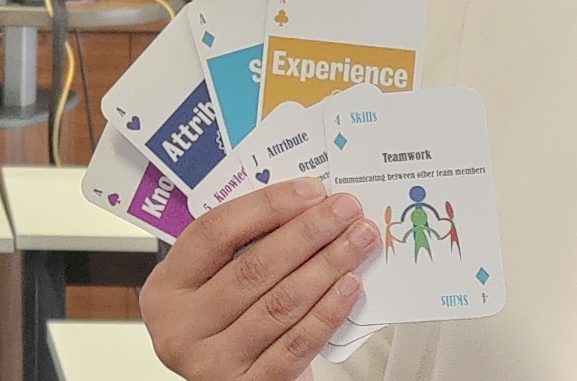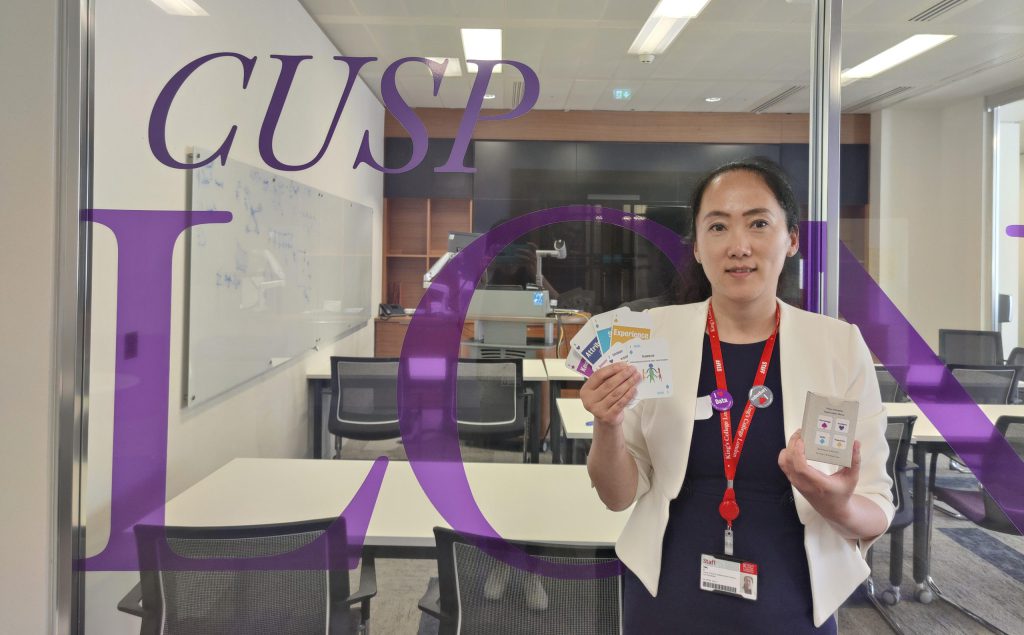
This case study is from Dr Yijing Li, Senior Lecturer in the Centre for Urban Science and Progress (London), CUSP London, Department of Informatics, NMES Faculty, King’s College London. She was awarded Faculty Teaching Innovation Project funding to integrate employability into an internship or placement in the MSc in Urban Informatics, which she leads.
What is the card game?
Students take a 15-credit placement module in industry or public sectors, under their partnerships with the Centre for Urban Science and Progress, London. To maximise the benefits of such placement, I co-designed a set of playing cards which link the King’s Careers & Employability KASE framework (Knowledge, Attributes, Skills and Experiences) with their placement and other taught modules in their programmes. For example, the 4 of Skills is ‘teamwork – communicating between other team members’. The Jack of Attributes is ‘organisation – being punctual to meetings. All of these cards of a certain number are related to each other – for example, having four jacks in your hand would represent the knowledge, attributes, skills and experiences for a complete workflow from project design to data manipulation and mapping skills, then to good delivery and presentation. Students can decide together what the rules are and how to win, and then they play to acquire the cards that correspond to the employability needs they identify for themselves.
Why did you make the game?
A placement within a one-year Master programme can feel very brief, but we wanted students to get as much benefits as possible from CUSP’s good partnerships with public sectors and industry. In light of such, I need a way to inspire students to reflect on the placement, connect it to their learning outcomes from other taught modules in the degree, and gain benefits for their future career. I was looking for some tools or packages that would be of help to students’ checking what they had learned at milestone points and deciding what to focus on next.
The cards are co-designed. Upon receiving the project funding, I initially consulted with current cohort students, alumni and external partners (who might be their future employers), and the statements from these interviews and discussions matched pretty well to the elements of King’s Career & Employability KASE framework, so I got inspired to build on that.
A card game had been identified as a good way to get students focusing on the comprehensiveness of employability, rather than just one or two traits in each module. By playing a poker-style card game they could think ahead to the knowledge, attributes, skills and experiences they are expected to achieve with in the future.
We’re trying not to push them but to lure them.
How does it work?
Similar to other playing cards, these have four suits which correspond to the KASE framework. The 13 numbered cards in each suit correspond to different aspects of these Knowledge, Attributes, Skills and Experience respectively. With 52 cards in a deck, our most recent alumni made a huge contribution helping us narrow down which KASE aspects to include and which to leave out. The divisions between the suits are not rigid – for example, Communication is present in both Skills and Attributes.
The rules are broadly like bridge or poker. Students could decide amongst themselves how many cards they will deal, which suits or combinations of cards are stronger (‘trumps’). This can vary depending on their progress in their MSc programme as well. For example, they can decide that if they can acquire all the 5s (known as a ‘flush’ in poker) across Knowledge, Attributes, Skills and Experience, that is stronger that one or two 5s. Or, at a certain point in their learning, they can decide that the suit of Experience is high, and a sequence (or ‘run’) in that suit are the desirable cards to get.
Students may also decide that, if you are dealt a card you can only keep it if you convince the other players that you have acquired or mastered that employability trait. The questions are all open-ended, to prompt reflection, rather than sticking to right or wrong answers. For example, there is one card for giving a presentation to a technical or non-technical audience. The player who is dealt or picks that card needs to tell the others how they interpret the card content or their experiences of that.
We use the linearity of the numbers on the cards to correspond to teaching and learning milestones in the syllabus, so they build and progress spirally on each other. This helps us prompt students to benchmark their knowledge, rather than purely for play. In the Knowledge suit there are prompts for urban theory – for example, the 5 of Knowledge is ‘Urban Theory – what services and systems does a city need to operate?’. With Knowledge, the lower numbers are addressed earlier in the programme and the higher numbers are more advanced, hence students are only expected to claim them towards the end of the module. The King of Knowledge is ‘Mapping – which coordinate reference systems (CRS) to use’, and we let students know that this is coming in Term 3. So that the Knowledge cards are ordered to prompt students to use them as discussion points, in the aim to recap what they have learned, and reflect on how their knowledge is developing over the course of the degree programme.
How do you introduce it to students?
After a pilot trial with current cohort in Semester 2, we decided the upcoming students should have the cards from the very beginning during their Induction week of the new academic year. We introduce them to the cards and let them know the benefits to help them become more aware of learning progress, and prepare them better for future job hunting. We emphasise that Knowledge and Skills are mostly covered in the programme’s taught modules, while Attributes are developed individually and Experience is designed to gain throughout Semester 3, when students complete their placement module and research projects.
We prompt students to use the cards in Semester 1 to orientate themselves to what they will learn, in Semester 2 then to check their Knowledge and Skills, and to start to benchmark their own Attributes so that they can decide what to focus on in Semester 3. We also let them know that they have the flexible scope to make the rules, but can start with any play rules they’re already familiar with – many of them play pokers before. This gives them a taste of structure for getting started, but also the power to change how they play to make it more relevant.
We also emphasise that we are not assessing their learning by using this, but rather helping them to do self-assessment, in the expectation that this addresses a gap between our formal assessment at the university, and the assessment that their future employers will be making. We reassure them that recent alumni were involved in designing the cards, which helps to convince them that the cards will be relevant and beneficial.
In all, this is a game and it’s purely developmental to be deployed in their own time, so we are not pressuring them to adopt it.
What benefits are you looking for?
We know that students have time on their hands when they’re on campus, but the pandemic has made it a bit more challenging to break the ice. We are looking for signs that the game can help students – especially international students – meet with each other and get talking.
There’s a low barrier to entry. If students just want to play poker together, they can do that. But we see that as they play more, they begin to read the words on the cards and we see them begin to make the connections with what they are learning – “Oh, this is very important because this week I just learned this software”, “Why is it number 8? I wonder what number 9 or number 10 are?”.
We have plans to follow up with recent alumni, and in a recap session where we use the cards.
What suggestions do you have for colleagues trying this?
The Knowledge suit will be distinct to each subject. To avoid getting lost in a sea of knowledge we found it helpful to think about the main themes, and then focus on a few sub knowledge points in each theme.
Working with our alumni was very important, and we have good links with them, with regular events to include them in a community culture. They have been great at feeding back into the community in turn. Although this is highly recommended, it might be challenging for some departments. An alumni event could be a good start, collecting ideas and questions quickly, and then bringing them back and asking them to rank those. That could be a light task for students to do – just choosing or ranking. We expect to do this to refresh our existing cards and keep them current.
What are your next steps?
We are planning to co-design another poker set with a department from another King’s Faculty, and hoping this will expand widely in the future. The students in current programme are enjoying it, and we will get their feedback towards the end of each Semester, to see how it works


Leave a Reply